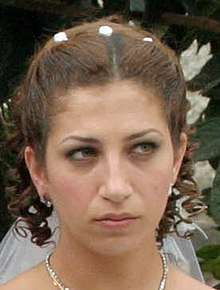Clara Khoury
Clara Khoury (Arabic: كلارا خوري, Hebrew: קלרה ח'ורי; born 29 December 1976) is an Arab Israeli actress of Palestinian origin. She works in film,[1] television and theater.
Clara Khoury كلارا خوري קלרה ח'ורי | |
|---|---|
 | |
| Born | 29 December 1976 Haifa, Israel |
| Occupation | Actress |
| Years active | 1998–present |
| Spouse(s) | Sean Foley |
| Website | www |
Biography
Clara Khoury was born in Haifa. She is the daughter of the award-winning actor Makram Khoury. Her family is Greek Orthodox.[2] She studied cinema at the Open University in Tel Aviv and drama at the Beit Zvi acting school. She is married to Sean Foley, an American with Irish and Egyptian roots.[2]
Acting career
Khoury has worked in a variety of roles on stage including the lead in Antigone by Jean Anouih, The Glass Menagerie by Tennessee Williams and Salome by Oscar Wilde, in Arabic as well as in Hebrew and English. Her television work includes the series Parashat Hashavua, written by Ari Folman, and Arab Labor written by Sayed Kashua. She made her big screen debut in 2002 in Rana’s Wedding[3][4] by Hany Abu-Assad (director of the Oscar-nominated Paradise Now) which premiered at the Semaine Internationale de la Critique at the Cannes Film Festival.
In 2005 she gained international recognition for her role in The Syrian Bride, portraying a young Druze woman who risks losing her family by entering an arranged marriage with a Syrian national.[5] Directed by Eran Riklis (Lemon Tree) the film won the Audience Prize at the Locarno Film Festival.
Khoury starred in Lipstikka, a British / Israeli psychological drama by Jonathan Sagall, in competition at the Berlinale 2011. At the Al-Midan Arabic Theater in Haifa she starred in Juliano Mer-Khamis's adaptation of Roman Polanski's 1994 movie Death and The Maiden after the play by Chilean playwright Ariel Dorfman.
Film
- The Inheritance - (2012) Hiam Abbass
- Lipstikka - (2011) by Jonathan Sagall
- Dusty Road - (2009) Rukaya Sabbah
- Body of Lies - (2008) Ridley Scott
- Liebesleben - (2007) Maria Schrader
- Forgiveness[6] - (2006) Udi Aloni
- The Syrian Bride - (2004) Eran Riklis
- Rana's Wedding - (2002) Hany Abu-Assad
Theater
- Death and the Maiden—Paulina - (2010) Juliano Mer-Khamis
- Hebron, Khalil / Rania -- (2007) Oded Kotler
- Period of Adjustment—Isabel - (2006) Dedi Baron
- Cruel and Tender—Laela - (2005) Artur kogan
- Salome—Salome - (2005) Ofira Henig
- The Glass Menagerie—Loura - (2004) Muneer Bakri
- Gilgamesh, He is not Dead—Houmbaba - (2003) Francois Abuo-Salem
- Anigone—Antigone - (2002) Gdalya Besser
- Tiger at the Gate—Andromaque - (2002) Ido Ricklin
Television
- Parashat Ha-Shavua - created by Anat Asulin, Rani Blair
- Kavanot Tovot - director Uri Barbash
- Arab Labor - written by Sayed Kashua
- Maktub - director Avi Mussel
- Papadizi - director Ori Sivan
- The Police Man - director Ram Levi
- Homeland - created by Gideon Raff, Howard Gordon, and Alex Gansa
- Baghdad Central - written by Stephen Butchard
Awards and recognition
Khoury won the Israeli Academy of Film and Television prize for best actress as Bushra in the television sitcom Arab Labor.[2] She won the Best Actress Award for her role as Rana at the Marrakech International Film Festival.
See also
- Theater of Israel
- Cinema of Israel
- Television of Israel
References
- "Clara Khoury IMDB (1976-)". IMDB.com. Retrieved 2011-01-14.
- Clara, the no-longer confused, Haaretz
- "PopMatters review of "Rana's Wedding"". popmatters.com. Retrieved 2011-01-14.
- "Arab Films review of "Rana's Wedding"". arabfilm.com. Retrieved 2011-01-14.
- Felperin, Leslie (2004-08-17). "Variety review of The Syrian Bride". Variety. Retrieved 2011-01-14.
- Cockrell, Eddie (2006-02-13). "Variety review of "Forgiveness"". Variety. Retrieved 2011-01-14.